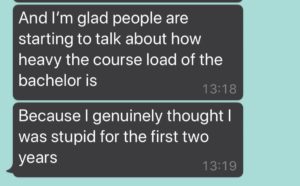Ritalin. Originally meant to improve concentration arcs of people with ADHD, has also been known to be a party-drug providing the user with a more energized feeling. However, over the last years, the medicine has been increasingly used with a different purpose: studying. Research shows a widespread usage boost among scholars, resulting in students even feeling left-out for not taking it when revising. A Medium survey among Communication Science-students swiftly proved that many are no strangers to Ritalin and have benefitted from using it many times to deal with the track’s excessive workload.
Earlier this year, newspaper Het Parool reported on a growing amount of students reaching out for concentration-enhancing stimulants. A short-term gain of obtaining good grades on an exam outweighs the long-term damage to many: while using Ritalin can be addictive and result in insomnia, palpitations, emotional lability and loss of appetite, as many as one out of every four Dutch’ students has ignored these side-effects in the hopes of a Ritalin-enhanced grade that will let the student pass the subject.
Pressure
The surge in Ritalin use among Communication Science students may be partly explained by the pressure to perform at university. Next to general stress, students are often troubled by debt and doubtful whether the education they picked was the right one. Combining this with a minimum amount of study credits students need to obtain in order to continue studying after one year, this provides a closer insight as to why Ritalin is so popular.
If you still want good grades then, secondary help might be very welcome.
In the words of one anonymous student: ‘’Reading 200 pages a week along with a project that is due at the end of the course, it all adds up very fast. Combining this with moving into Amsterdam and finding the rhythm of university-life, I can easily imagine the workload being overwhelming sometimes. If you still want good grades then, secondary help might be very welcome.’’
‘’It wasn’t actually that hard to get it. I just got it through a friend who also studied Communication Science and said it worked really well. And I did have a lot of articles to read, so why not?’’ a now graduated Communication Science student tells us. ‘’In first year, I didn’t feel like the coordination between the different subjects was really well managed. If you then have two courses that are very theoretical and is a lot of reading, it is sometimes hard to keep up with all the subject matter. One pill provided me with four hours of uninterrupted studying, which especially in the first year was more than welcome.’’
Mental Problems
The increasing use of focus-improving stimulants has not only taken its toll on students and their physical health, but also on their mental health being affected by peers consuming the ‘study drug’. Scholars feel stupid for not taking Ritalin and some feel anxious when admitting the coursework is sometimes too much to handle.
‘’I genuinely thought I was stupid for the first two years [of the study]. I’m glad people are starting to talk about how heavy the course-load of the bachelor is.’’

A re-emerging pattern among students surfaces when discussing Ritalin: those who have tried out study-enhancing drugs all did so in the first year of the bachelor. Later, when the focus of the course shifts from the theoretical subjects to the practical stages as the internship or the thesis, the demand for concentration stimuli evidently decreases. One student even suggested the high workload in Communication Science being ranked as the number one study in the world for the past few years, rather than the actual courses. Being accustomed to a heavier workload leads to more content being treated and a greater communication-related knowledge as a result.
‘Just Put Your Phone Away’
According to Ruud Coolen, CEO of the institution for Responsible use of Medicine, the solution to decrease Ritalin-use is easy: ‘’If students put their phone away for a few hours, you’ll see the focus becomes much better. Right now, they are constantly distracted by all the messages they receive. When there is no device in sight, you’ll see that the focus increases.’’ The suggestion is met with sarcastic laughter by actual students. ‘’As if we don’t know how to study. The problem is not the way we are taught or that the subject matter is too difficult; it is just too much in too short of a period. Putting down my phone won’t change the workload we have to do.’’
While Communication Science already expects students to treat the majority of the course as self-study, the aftermath of the COVID-19 crisis will only increase the amount of work scholars have to do at home. As on campus education is not possible until at least January 2021, it is only logical to assume that students are required to put in extra work in order to compensate for the missed face-to-face sessions. The workload increases while the time to study remains the same. With more coursework, more financial pressure and fewer options to receive guidance from teachers, it seems to be that Ritalin will be very prevalent at Communication Science for many years to come.
Photo: Pixabay





